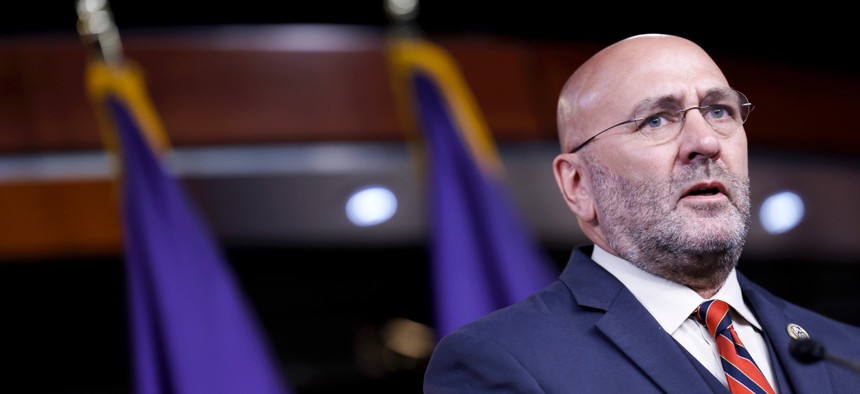
Rep. Clay Higgins, R-La., co-sponsored legislation to place limits on the IRS' use of artificial intelligence to conduct taxpayer audits. Anna Moneymaker / Getty Images
GOP bill aims to limit IRS’ use of AI
The legislation — cosponsored by Reps. Clay Higgins, R-La., and Eric Burlison, R- Mo. — could look to put new restrictions on the tax agency’s deployment of AI in its revenue enforcement efforts and require staff to launch new investigations.
A new House bill could seek to constrain the IRS’ use of artificial intelligence to assist in its enforcement efforts.
The legislation, dubbed the No AI Audits Act (HR 7694) aims to amend the tax code to require that any investigation be initiated by IRS staff, while putting limits on the agency’s use of the technology.
The bill introduced Friday and cosponsored by Reps. Clay Higgins, R-La., and Eric Burlison, R- Mo., could potentially upend efforts by the IRS to improve its compliance practices by deploying the emerging technology.
“The weaponization of AI technology is an ominous threat to our constitutional freedoms,” said Higgins, in a statement Tuesday. “We, as a Congress who have been sworn to serve the people, must think seriously about the implications of the rapid deployment of AI technology. We must focus on the balance between the power of AI and the dangers it holds for freedom-loving Americans and our national security.”
Specifically, Higgins and Burlison’s proposal would prevent the IRS from conducting an audit based on AI-enabled analysis unless the IRS commissioner determines that the AI in question meets the National Institute of Standards and Technology’s Four Principles of Explainable Artificial Intelligence and that any taxpayer investigation or examination must be initiated by an IRS staff investigator.
IRS Commissioner Danny Werfel detailed the agency’s plans last fall to utilize AI tools, including plans to audit 75 large partnerships, each with assets over $10 billion on average.
“These new tools are helping us see patterns and trends that we could not see before,” Werfel said in September. “As a result, we have higher confidence on where to look and find where large partnerships are shielding income… In other words, who are the large partnerships that are shielding income, and where will we find it?”
Use of the AI tools are part of a strategy to help the agency bolster its enforcement efforts through information technology modernization, combined with a planned hiring surge, with funding from the Inflation Reduction Act.
However, the IRS’ hiring efforts recently seemed to have been stymied, with just 34 new hires recorded in the first half of fiscal 2023, off the pace of the 3,833 revenue agents the agency had set as its goal.
According to a July 2023 Government Accountability Office report, the agency has deployed AI in areas like the IRS’ Large Partnership Compliance Model — one of two statistical models designed to analyze the data from the tax returns of large, complex partnerships, whose audit rates have been declining due to budget constraints.
The Large Partnership Compliance Model could be used to prioritize tax returns and to provide information to audit teams about potential noncompliance risks found within them, possibly replacing its current statistical model, GAO officials said.
“In April 2023, IRS used the new model for the first time to identify 150 large partnership returns from tax year 2021 for additional review by classifiers,” the report said. “A subset will be selected for potential audit, contingent upon hiring and training efforts related to IRA funding.”
The report went on to note that the AI model and the IRS’ current statistical model both needed improvement, including “using more representative data to uncover previously unidentified areas of noncompliance, testing assumptions used to design the models and using feedback and audit outcomes or other research to improve model performance.”
Higgins and Burlison’s bill, which has been referred to the House Ways and Means committee, also calls for the U.S. Comptroller General to conduct an audit of the IRS’ use of AI to execute its duties and functions and a cost-benefit analysis of its use, “including any adverse effects the use of the technology has on taxpayer rights.”







